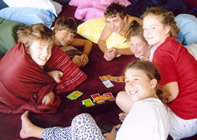GROWING UP TOO FAST HIGH SCHOOL STUDENTS AT HIGH RISK
WHAT CASA FOUND ABOUT TEEN Half of teen party goers acknowledged that that alcohol, marijuana or both were usually available at the parties they attended, and one third of the teens reported that parents weren’t around at parties they attended. Twenty-seven percent of teens said that drugs were their greatest concern. By age 17 almost half said they had attended a party where teens were drinking alcohol, smoking pot or using cocaine, Ecstasy or prescription drugs while a parent was present, and 70% of the teens said they’ve been offered an illegal drug. WHAT PARENTS DON'T KNOW HURTS TEENS Parents of the teens surveyed showed great naiveté related to teens’ substance abuse. Eighty percent of these teens’ parents believed that neither alcohol nor drugs were available at the parties their teens attended and 98% claimed they were normally present during the parties their teens hosted, despite one third of their children saying that parents are rarely at the parties attended. While 99% of the parents say they would never serve alcohol to teens at a party, their teenagers report differently. Twenty-eight percent of them reported drinking and using drugs at parties where parents were present and as mentioned above, by age 17 that percentage increases to almost half. Apparently the parents are either not reporting honestly or are “looking the other way.” COLLEGE DRINKING AND Parents should prepare teens for college where the party scene and drinking and drugs often spell the difference between dropping out and graduating. In her book The Parent’s Guide to College Life3, Raskin points out the average number of admitted drinks for students with D’s and F’s is 9 1/2 per week. Seventeen hundred college students die a year and almost 600,000 suffer unintentional injuries because of drinking. There are also 97,000 reported cases of sexual assault tied to alcohol. When teens and parents visit colleges, it may be best to ask questions about the extent of alcohol and drug abuse on college campuses. When parents express concerns, colleges may take these problems more seriously. TEEN SEXUAL ACTIVITY Sexual activity is also on the rise and according to our study, the average age of first sexual intercourse is now 15, this is freshman or sophomore year in high school. A 2005 Center of Disease Control and Prevention (CDCP)4 survey found that 55% of boys and 54% of girls between the ages of 15 and 19 had participated in oral sex and only 9% of them indicated they had used condoms. Forty-nine percent of boys and 53% of girls of similar ages reported having had sexual intercourse. According to a 1998 study by the Kaiser Foundation and YM Magazine5, 19% of those who reported sexual behavior believed they wouldn’t have became sexually involved except for the influence of drugs and alcohol. There’s plenty of peer pressure on teens to become sexually active, and there are teens who say, “It’s childish to still be a virgin by high school graduation.” MOST FREQUENTLY ASKED QUESTIONS
Parents and teachers may be interested in knowing the most frequently asked questions that came from a recent high school audience. You’ve probably already guessed that the topic asked about most was sex! And while I answered the “sex” questions last, in hopes of keeping the audience alert, just the topic announcement was greeted by an excited roar. The actual questions revealed plenty of serious worries about AIDS, STD’s and pregnancies, so despite the joys of their very early sexual lives, kids had plenty of concerns. Some asked how to protect themselves from physical and sexual abuse and wanted to understand how to define abusive behavior. Next in frequency were the questions about alcohol and drugs—and these came both from students who proclaimed drugs shouldn’t be considered so bad, as well as from those who wanted to know how to avoid them. There were quite a few questions about dealing with parents’ divorces, stress and overload at school, overweight, and getting along with parents. One student asked me to define what normal standards were for adolescent development, and one teen wanted to know how to get through her teen years without having to say “no” to everything. TAKE THE TIME TO TALK
STAY UNITED FOR TEENS
The anti-arguing alliance provides a model for positive communication between adults and children who are in a habit of arguing and continuously pushing limits. The model is effective for parents, teachers and teens. Ally with a positive statement.
|
1Sylvia Rimm, Growing Up Too Fast: The Rimm Report on the 2The National Center on Addiction and Substance Abuse at 3Raskin, Robyn, The Parent's Guide to College Life, The Princeton 4Centers of Disease Control and Prevention, Physical activity levels 5Henry J. Kaiser Family Foundation and YM Magazine, National ©2008 by Sylvia B. Rimm. All rights reserved. This publication, or parts thereof, may not be reproduced in any form without written permission of the author. |
©2010 by Sylvia B. Rimm. All rights reserved.
Report any problems with this site to Webmaster@sylviarimm.com

 The research for my book Growing Up Too Fast
The research for my book Growing Up Too Fast

